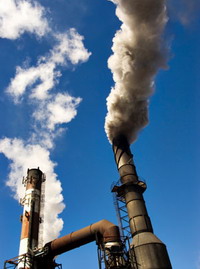Canada stands for international climate agreement that places binding targets on top carbon emitters
Canadian Prime Minister Stephen Harper wants the United States and China to be the cornerstones of a new international climate agreement that places binding targets on the top carbon emitters.

Harper spoke ahead of a 16-nation climate gathering starting Thursday in Washington, hosted by the Bush administration.
Harper participated in a high-level climate change summit at the United Nations on Monday - a meeting meant to garner support for a new global warming agreement to replace the Kyoto pact before a year-end climate conference in Indonesia.
"Let me be clear. Canada believes we need a new international protocol that contains binding targets for all the world's major emitters, including the United States and China," Harper said in a speech at the Council on Foreign Relations. "And it is through such targets that the development and deployment of new clean-energy technology will be stimulated."
In a move that has drawn criticism at home, Harper announced Monday that he would join the Asia-Pacific Partnership on Clean Development and Climate - a voluntary U.S.-led forum that many see as a rival to the Kyoto Protocol and an inadequate solution for global warming.
Canada, which signed the Kyoto agreement, has failed to meet its targets for greenhouse-gas emission reductions.
The forum, which also comprises Australia, China, Japan, South Korea and India, seeks to reduce pollution by promoting cleaner technologies but does not set limits on the amounts of global-warming carbon that a member country can produce.
Harper and Bush have both expressed concerns that certain mandates on curbing greenhouse gas emissions would hurt their respective economies.
"The solution to climate change cannot and will not be "one size fits all," but neither can nations treat this issue as "someone else's responsibility," Harper said.
"In the global fight against climate change, Canada will do everything in its power to help develop an effective, all-inclusive, international environmental framework that recognizes national economic circumstance," he said.
"We're implementing a national system of mandatory greenhouse gas emission reductions across major industrial sectors," Harper said. "Our plan will reduce Canada's total emissions 20 percent by 2020 and 60 to 70 percent by 2050."
It is hoped by many that the annual U.N. climate treaty conference, scheduled for December in Bali, Indonesia, will initiate talks for an emissions-reduction agreement to succeed the Kyoto Protocol in 2012. A new deal would almost certainly would require a change in the position of the United States, long the world's biggest emitter of greenhouse gases.
The 175-nation Kyoto pact, which the U.S. rejects, requires 36 industrial nations to reduce the heat-trapping gases emitted by power plants and other industrial, agricultural and transportation sources. The 1997 agreement set relatively small target reductions averaging 5 percent below 1990 levels by 2012.
The two-day Washington conference, hosted by President George W. Bush, is the first in a series of U.S.-led gatherings expected to focus on climate themes. China and India are among the 16 nations attending.
Subscribe to Pravda.Ru Telegram channel, Facebook, RSS!




